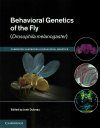![Behavioral Genetics of the Fly (Drosophila melanogaster) Behavioral Genetics of the Fly (Drosophila melanogaster)]()
Click to have a closer look
About this book
Contents
Customer reviews
Biography
Related titles
About this book
The common fruit fly – Drosophila melanogaster – has been the subject of genetics research since the early twentieth century. The complete genomic sequence of Drosophila was published in 2000 and it is still the model organism par excellence for the experimental study of biological phenomena and processes. It is also by far the best model for studying gene function in mammals, including humans. Presenting state-of-the-art studies on the behaviour of Drosophila, Behavioral Genetics of the Fly (Drosophila melanogaster) discusses normal and pathological models of neurobehavioral disorders and encompasses the specialised methods that have been used, from anatomical, histological, immunohistological and neurophysiological to genomic, genetic and behavioural assays. A comprehensive and thorough reference, Behavioral Genetics of the Fly (Drosophila melanogaster) is a valuable resource for students and researchers alike across several disciplines of life sciences, including behavioral genetics, neurogenetics, behavioral neuroscience, molecular biology, evolutionary biology and population biology.
Contents
List of contributors
1. The anatomical organization of the compound eye's visual system Ian A. Meinertzhagen
2. Neuropeptides regulating Drosophila behavior Dick R. Nåssel
3. Vision Nina Vogt and Claude Desplan
4. Sensory coding of olfaction and taste Christi A. Scott and Anupama Dahanukar
5. Nociception Ken Honjo, Jessica Robertson and W. Daniel Tracey, Jr
6. Flight behavior: degradation of flight muscle power and locomotor capacity in transgenic Drosophila Fritz-Olaf Lehmann
7. Behavioral genetics of Drosophila female postmating responses C. Dustin Rubinstein, Brigitte Dauwalder and Mariana F. Wolfner
8. Circadian rhythms Nara I. Muraro and M. Fernanda Ceriani
9. Courtship learning Leslie C. Griffith
10. Place memory Daniela Ostrowski and Troy Zars
11. Neurodegeneration models in Drosophila Bidisha Roy and George R. Jackson
12. Drosophila model of cognitive disorders: focus on memory abnormality Lisha Shao and Yi Zhonga
13. Age-related memory impairment in Drosophila Minoru Saitoe, Shinjiro Saeki, Yukinori Hirano and Junjiro Horiuchi
14. Functional analysis of natural clock gene variation Charalambos P. Kyriacou
15. Natural variation in foraging behaviour Bryon N. Hughson, Viet Pham and Marla B. Sokolowski
16. Using neuron-specific RNAi in Drosophila for understanding the molecular and neuronal basis of behavior Ricardo Leitão-Gonçalves and Carlos Ribeiro
17. Systems genetics of behavior in Drosophila Robert R. H. Anholt, Trudy F. C. Mackay and Eric A. Stone
18. Olfactory learning and memory assays Christopher J. Tabone and J. Steven de Belle
19. Intersectional strategies for cell type specific expression and transsynaptic labeling Taylor R. Fore and Bing Zhang
20. Imaging Drosophila brain neurons for 'FlyCircuit' analysis Chih-Yung Lin and Ann-Shyn Chiang
References
Index
Customer Reviews
Biography
Josh Dubnau is an Associate Professor at Cold Spring Harbor Laboratory. His research focuses on genetics and circuitry of memory and mechanisms of neurodegeneration. He received the Beckman Young Investigator award and Human Frontiers Young Investigator award. He is also the recipient of a Transformative R01 from the NIH. Former President of the International Behavioral and Neural Genetics Society, he has been twice selected by graduate students for the Winship Herr Teaching Award.


































